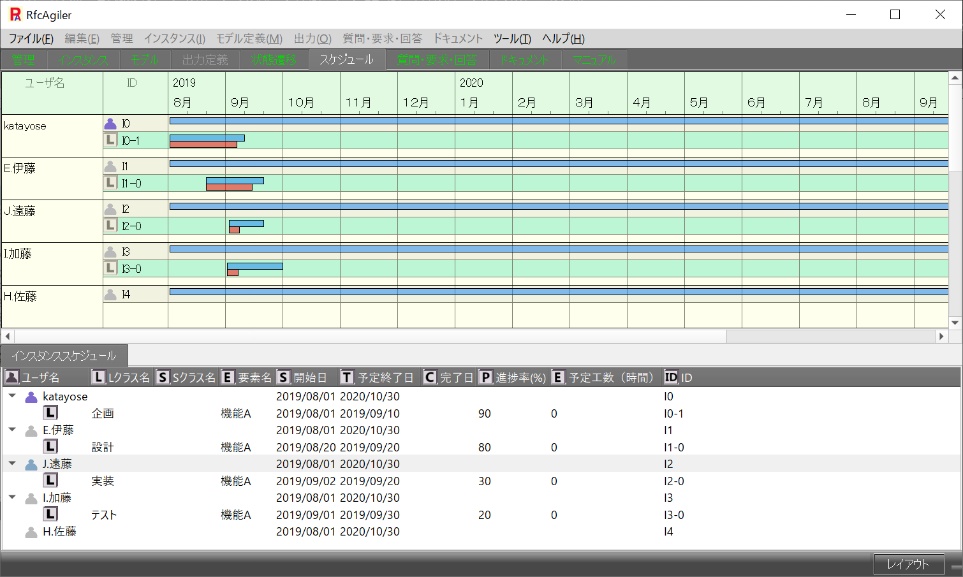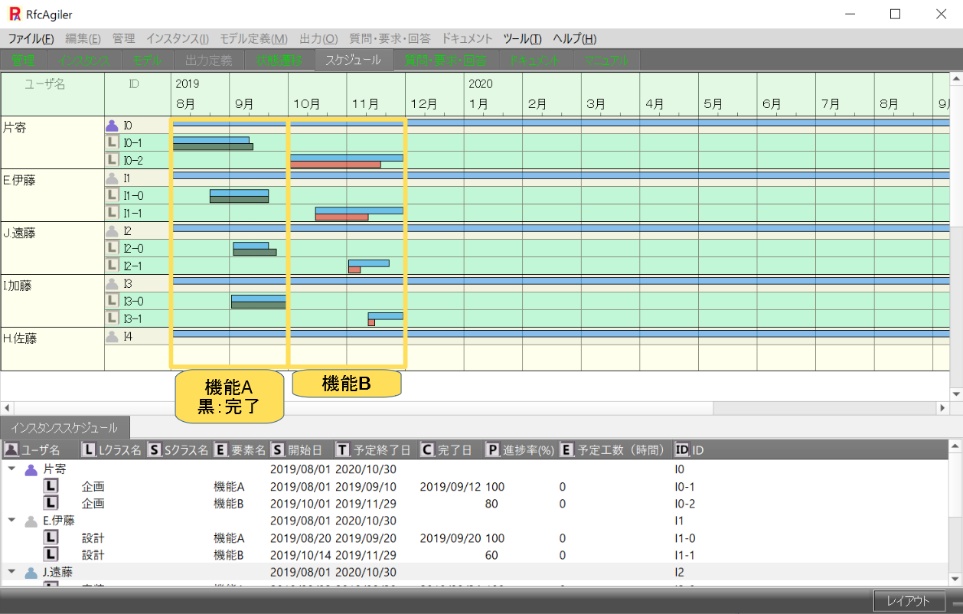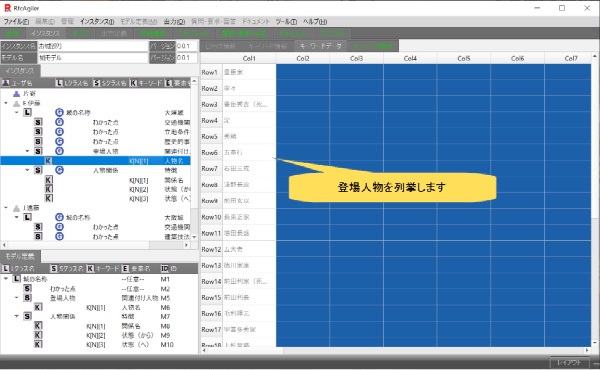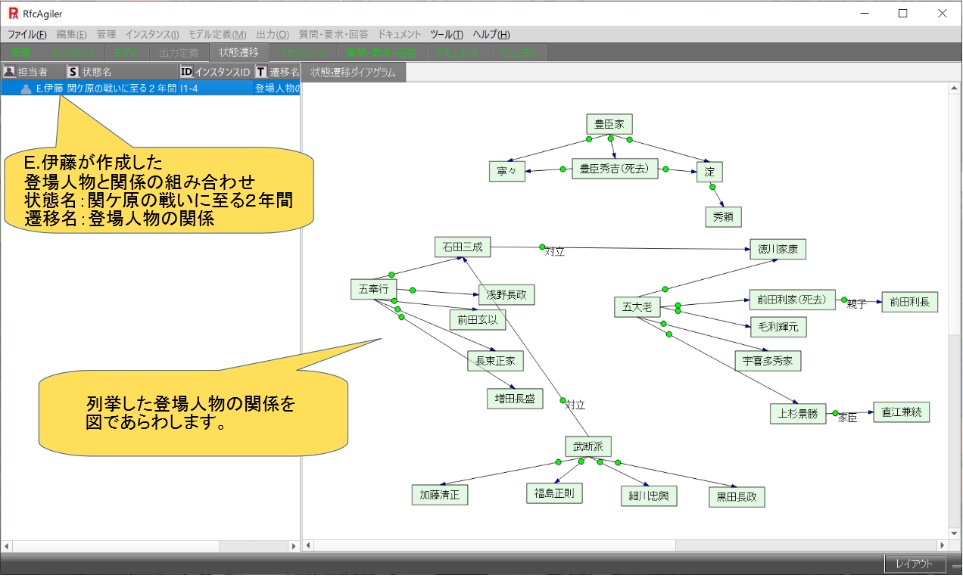 Field
of app
Field
of app

Field of app
1.Agile
development
2.waterfall
development
3.Researcher's
Theme Arrangement
4.Organizing
student themes
Organizing
at the exam
[Organize
by yourself]
[organize
with friends]
5.Organizing
hobbies (history, collectors, etc.)
In addition to the above, it can be used in various fields
1.Agile development
You can easily plan, design, implement,
and test the process using the model template,
divide the
development into small units, and carry out iterations to proceed with
development.
Looking at the figure below, each person in
charge develops function A.
Customers also participate as
members and help improve the functionality.

During work, each person in charge sets the progress rate and
checks the overall progress
(Blue
is the scheduled completion date, red is the progress rate,
and the progress date is calculated from the scheduled completion date)

For
each process, other people in charge and customers confirm the contents,
and if there are questions or requests, specify the process and ask
questions and
requests
for improvement.
(Extreme Programming Communication and Feedback)

Scrum-like
communication in a remote environment deepens communication and
records
it as a history by using questions, requests, and answers to them between
people
in charge.
When
function A is finished, develop function B.
Person
in charge
adds feature B.

Check
the progress of this whole work in progress.
Function
A is all completed and you can see the work progress of function B.

Add functions in the same way
※See"https://backlog.com/ja/blog/what-is-agile-and-waterfall/"
for Agile Development
2.waterfall
development
Waterfall decides all functions and flow at the planning stage.
Therefore, in RfcAgiler, we first consider the configuration in the document
and
summarize the necessary functions.

Once
the overall function is organized in the document, set the function and
schedule for each person in charge in the instance

See
your progress while working in the waterfall

Associates
a document with something created by an instance.

3.Researcher's
Theme Arrangement
Here
we will organize communication protocols and discuss group interactions.
Communication
Protocol: Modifications for transport layer TCP.
Two people categorize and organize TCP remodeling and set the remodeling
points
in the reference file.

Set the state and state transition with the categorized keywords,
and display the state transition diagram.



Ask
each other questions and improve.

4.Organizing
student themes
Students
make a schedule, decide what to do by when, and categorize themes.
We
will add the materials used in each classification as reference files.
If
there is something you don't understand, ask a question.
If you do it alone, you will get the answer from the reference materials
etc.
for the question and answer the question.
If you have more than one person, write the question, if any,
and choose who will answer it.
With a schedule, you know how to proceed and complete it.
In addition, there is an exchange of questions and answers on the classified
themes, and you can see which points you have weaknesses.
In the model definition, create a template for organizing
(here, create a simple template, but feel free to create a template that
suits you)
In the figure below, factorization,
simultaneous equations, etc. are set
for mathematics in the
first year of high school.
(Please
categorize and set this as it suits you)

Set
the start date, scheduled completion date, and progress rate
for each theme, and check the schedule.

If
there is something you don't understand after learning about each of them,
set a question about the
part you don't understand and get an answer.
(If
you are alone, you will answer by yourself, but if you are in a group,
you will ask the group to answer.)

Copy the notes you took in class with your smartphone and add them to
the reference file as images.
Double-click the added file to start the default application and display the
image.


5.Organizing
hobbies (history, collectors, etc.)
If you collect and organize materials as a hobby,
you can classify and organize the collected materials.
In addition, it will be enhanced by increasing the items of classification
from a new perspective.
For example, when a group of people who are visiting castles as a hobby
exchange information about castles, they provide information about castles
from
various perspectives.
We provide information on each other's castles from various perspectives.
(Common
Viewpoint, Unique Viewpoint)
In the model definition, set the L class name to Castle name
and set the element as desired.
(In
instances group members set the name of the castle)
The S class makes the element optionalin "that it is
known".
Set the element whose S class name is "character" with the associated
person,
and set the element name of the keyword (type: state) with the person name.
The S-class name sets the element with the characteristics of the person.
Make the element name of the keyword (type: state transition) the relation
name.
Element names are automatically created: state (from) and state (to).
In the chart below each member makes various statements about the name
of the castle at what they know.
If there are reference files (materials) or reference URLs
for each (L class, S class), register them.

Keyword elements:
Keyword elements:
Regarding the character name,
Regarding the relationship name,
set the character name as shown
set the transition name in the figure below
in the figure below, assuming
that
as the relationship between the characters,
the state name is the two
years
and the data for the state(from) and state(to)
leading up to the Battle
of Sekigahara.


Based on the data entered above, the relationship between the characters is
shown in the figure below.

 Field
of app
Field
of app























